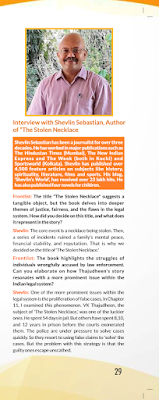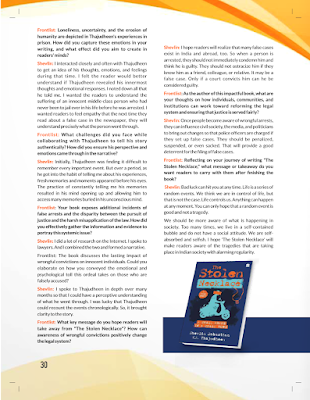Shevlin Sebastian's Blog, page 11
November 7, 2023
At Deathâs Final Stop

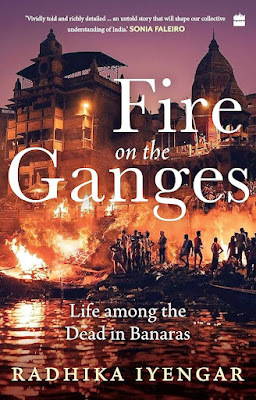
 Manikarnika Ghat. Photo by Dennis Jarvis
Manikarnika Ghat. Photo by Dennis JarvisRadhika Iyengarâs debut non-fiction work, âFire on the Ganges: Life Among the Dead in Banarasâ, takes an in-depth look at the much-maligned community of the Doms. They have been cremating the dead for centuries
By Shevlin Sebastian
As Radhika Iyengar walked through the narrow lane leading to the Manikarnika Ghat in Banaras, she heard a rhythmic chant. It rose and fell. The people were chanting âRam Naam Satya Haiâ (Godâs name is the truth).
She stood at one side of the ghat. It is one of the oldest burning ghats on the banks of the Ganges. An inscription about the ghat dating from the 5th century AD Gupta Empire has been found.
Radhika saw several pyres burning at the same time. A few brown-skinned men were lighting other pyres. They were, of course, the Doms. Smoke rose in the air. On the ground, she saw a lot of ash. At one side, a barber was shaving the face of a mourner. On another side, there was a tea stall.
Some men, with bent backs, brought logs into the area. Every few minutes, pall bearers brought bodies on bamboo biers. Stray dogs wandered about. Several men sat on their haunches and watched the proceedings. Out on the surface of the Ganges, Radhika could see marigold garlands floating.
âIt was a spell-binding experience,â she said. In 2015, she had come to Banaras to do a report on the Dom community for her thesis project. At the time, Radhika was doing her Masters in Journalism at Columbia University.
Little did she know then that she would come many times, as the idea crystallised to do a book on the community of Doms. They belong to the Dalit community. Society considers them as an untouchable caste. For centuries, their primary job has been the cremation of bodies. There is a belief Doms should cremate upper-caste Hindus if they are to attain moksha (relief from the cycle of rebirth).
âA Domâs work is highly skilled,â said Radhika. âIt is also dangerous and underpaid. Since it is a profession that is anchored in the caste system, the work is passed down from father to son. For many Dom families, there are no alternative work opportunities.â
What pained Radhika was the humiliating way the upper castes treated them.
A few children from the community sometimes accompanied Radhika to the ghat. They would avoid a route that had a small temple. Instead, they would request Radhika to take another way. Later, she realised the children avoided that alley, because the priest would shoo them away. They could not be near the temple premises. âIt was unsettling to learn that,â she said.
Radhika also perceived the huge psychological effect this had on the children. âThey had no means to cope and no language to express their angst,â she said.
The children also saw dead bodies from an early age. One boy told Radhika that he was only five years old when he saw a corpse. After that, for weeks, the dead manâs face would haunt him in his dreams.
Even the adult Doms went through trying times. The labour was very hard. On summer days, with the heat from the pyre and the climatic heat, it took a toll on their health. Radhika said they could not afford proper medical care. Their burns and wounds went untreated. To see a doctor, they sometimes borrowed money to pay the bills. This led them into debt.
And to cope, they consumed large amounts of alcohol, gutka and ganja. âThey do it to forget the stark reality of the work they do, and the lives they lead,â said Radhika.
It took courage and determination by Radhika to befriend the members of the community. She found it easier to talk to the women. âMy frequent visits to Chand Ghat made me a familiar face,â she said. âThe more time I spent with them, the more they realised I was serious about my work.â
The men were not forthcoming initially. âI was a stranger from a different city. They were also not used to having a woman asking questions about their work or their lives.â
But Radhika persisted. She began writing the book in 2019 and completed it in 2023.
And interacting with the Doms affected Radhika. âSome stories they shared with me were raw and emotional,â she said. âItâs impossible not to be affected. But I tried to ensure that my opinions did not seep into the process of storytelling.â
The book, âFire on the Ganges: Life Among the Dead in Banarasâ (HarperCollins Publishers) is an absorbing read. Radhika delves into the struggles, the sufferings, and the agonies of the Dom community.
The intense politics between family members, the jealousies, the anger, and the hate. Radhika described the financial hardships they faced and their problems with addiction. She also spoke about the difficulties of the new generation in moving away from this strenuous life and to try something new.
There is a youngster called Bhola. He had a great desire to study but was forced to stop in 2001 when he was seven years old because of poverty. In 2006 film-maker Vikram Mathur made a documentary on the Manikarnika Ghat and focused on the boys who ran around collecting the shrouds from the dead bodies. In 2009, an American named George Grey saw the premiere in New York. He felt he had to do something.
George and Vikram came to Banaras and offered to fund the education of the boys. The parents demurred saying they preferred their children work to earn some money. In the end, George agreed to pay Rs 1500 a month to the parents to make up for the loss of income the boys would have earned. And the boys, including Bhola, were enrolled in a school in Cholapur. It was a few hours away from Banaras. Later, Bhola graduated from a college in Ludhiana, and managed to get a job in Chennai. To his relief, nobody knows he belongs to the Dom community.
There is a story of Komal, a Brahmin girl, who fell in love with Lakshaya, a youngster of the Dom community. Lakshaya was studying in a school. Soon, neighbours came to know. Expectedly, there was fierce opposition from both families. But they ran through the gauntlet of fire for a few years before they got married.
The death of one male member, Sekond Lal, the husband of Dolly, had a searing impact on the community for several years. There was suspicion that two neighbours, Gopi and Bunty, had murdered him. But the family members said the police told them it was an accident.
Here is an excerpt:
âIn 2019, even though some years have passed since his death, a strange disquiet continues to linger in Dollyâs body. It makes its presence known whenever she speaks of Sekond Lalâs death or of those who she believes are his murderers. The disquiet manifests in the form of dry grunts, a widening of her eyes, and incessant name calling. Tired and alone, Dolly is consumed by feelings of anger, sadness, betrayal, and vengeance. She slings accusations at Gopi and Bunty routinely, and at times, she issues roaring threats. âI say this: those who have murdered my husband â the way they have stolen my youth, the same way their youth will be ruined.â
After you finish reading the book, you will look at the Dom community with new eyes. You would have seen them from the inside.
A possible future Hindi translation, available at Banaras, might remove the scales of prejudice from the eyes of the higher castes. At Manikarnika Ghat, they might even treat this much-maligned community with sympathy, respect and kindness.
(Published in The Federal)
October 30, 2023
‘I don’t know how long India will hold together’
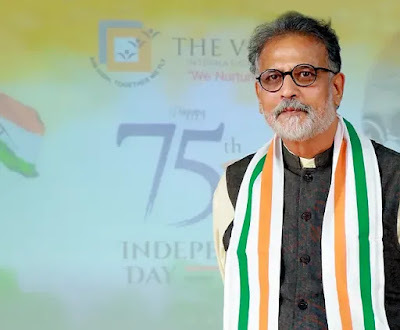
Human rights activist, Tushar Gandhi, the great grandson of Mahatma Gandhi, while on a recent visit to Kochi speaks about the rising acceptance of Hindutva among the people, the fear of the minorities and the inroads the Sangh Parivar has made in Kerala
By Shevlin Sebastian
At 7 am., on August 9, Tushar Gandhi, the great grandson of Mahatma Gandhi, went down the stairs of his apartment building in Santa Cruz, Mumbai.
He was on his way to commemorate the Quit India Day at August Kranti Maidan in Tardeo. It was the day the Mahatma asked the British to Quit India with the slogan ‘Do or die’. This day is also celebrated as a tribute to the sacrifices made by the Indian people during their struggle for independence.
When he reached the compound, a group of men came up to him. Tushar recognised two men as police officers, although they were all in plainclothes.
“Where are you going?” said one officer.
“You know where I am going,” said Tushar. “That is why you have come to stop me.”
“No, no, it’s nothing like that,” said one officer. “Our senior inspector [Rajendra Kane] would like to speak to you.”
“Connect me on the phone,” said Tushar.
“No, no,” he said. “Come with us to the [Santa Cruz] police station.”
“I am not coming to the station,” said Tushar. “I have to reach Chowpatty at 8.30 a.m. Give him my phone number and let him speak to him while I am travelling.”
After a to-and-fro conversation, they gently coerced Tushar to go to the station. They took him to the senior inspector’s office.
Rajendra said, “The DCP [Krishna Kant Upadhyay] is coming. You need to wait.”
Tushar again urged the police to release him, but they did not agree.
The DCP came and there was a friendly conversation, which lasted for an hour. They asked about Tushar’s ancestry and they expressed their admiration and respect for Mahatma Gandhi.
When asked about the police's political leanings, Tushar stated they were adept at concealing them. “They are like chameleons. Whoever is in power, they will align with them.”
As they spoke, the police were monitoring the television. There was an official function at August Kranti Maidan. The Chief Minister Eknath Shinde, Deputy Chief Ministers Devendra Fadnavis and Ajit Pawar and other ministers were taking part. They were launching the ‘Mera Mati, Mera Desh’ campaign during the Quit India celebrations.
During this time, the police also prevented the noted human rights activist Teesta Setalvad from going out. “The police told her that if she tried to leave, they would arrest her,” said Tushar.
Teesta is out on bail for the many cases the central government has filed against her. She messaged Tushar about what to do. He replied, “Please don’t force the issue. It is not worth risking your freedom.” The police detained a couple of other activists at Lamington Road station.
At 11.15 am, the function concluded. Tushar was told he could leave. This was the first time in his life the police had detained him, although nothing was recorded officially. “Apparently, they were afraid we would stage a demonstration in front of the Chief Minister,” he said. “Why should we? We Gandhians are a peaceful group.”
Thereafter, Tushar went to August Kranti Maidan. Around twenty other activists turned up. Among them was the oldest freedom fighter, GG Parekh, 99, as well as Teesta. They sang songs and hymns and saluted the Indian flag.
Tushar came to Kochi on October 21 on a two-day visit. He took part in a ‘Secular Indian Movement Conference’ and inaugurated a museum on Tibet set up by the Friends of Tibet Foundation.
On Saturday afternoon, Tushar leaned against a sofa in the sixth floor room of the Government Guest House, and smiled kindly. He was a seasoned interviewee. As soon as I asked a question, the answer flowed out immediately, in long and steady sentences, spoken in a calm voice.
Here are excerpts from the interview:
What is your purpose in life?
To speak about the ideals of Mahatma Gandhi, and the necessity to preserve the soul of India. It keeps me engaged and active. But the negative aspect is that my family is always worried about my safety [Tushar’s family includes wife Sonal Desai, a retired banker, son Vivan, who works with the legal department of the UK government in London, and daughter Kasturi who works with an NGO, Dasra Foundation, Mumbai].
There is talk that Mahatma Gandhi is being erased. Do you agree?
What is being attempted is to erase the ideas of Gandhi: truth, ahimsa, inclusiveness and equality. These are the cornerstones on which man has built civilisations. The hate campaign against him is systematically orchestrated and conducted. The government has created a Gandhi, which is convenient: the Gandhi of his spectacles and of cleanliness.
They don’t want a Gandhi who is pointing a finger and saying ‘You are wrong’. They have erased him from textbooks. But they are also erasing whole chunks of history, which is not acceptable to their viewpoint.
Do you detect a pervasive fear in your travels around the country?
I do. The liberal and secular-minded people feel they are in a minority. They are feeling intimidated. The minorities are always fearful. There is a concerted campaign to terrorise the Muslims and Christians: the mob lynching, the economic boycotts, and hate speeches. They also target the lower castes.
The Bahujans, Adivasis and Dalits may be over 60 percent of the population. Which is why the Centre does not want to conduct a national census. The upper-castes have conducted a genocide on the lower castes for over 5000 years. There was a viral video of an upper-caste politician [BJP worker Pravesh Shukla] in Madhya Pradesh peeing on a lower-caste man [Dashmat Rawat]. But it did not evoke widespread horror or anguish among the majority community. However, that did not surprise me.
Is the Hindutva ideology here to stay?
Yes. People in South India have largely accepted it as well. It is now a popular choice of the people. Earlier, the upper castes supported it and it remained on the fringes. Now it is mainstream. In North India, the people of Uttar Pradesh, Madhya Pradesh, Rajasthan and parts of Bihar have embraced it whole-heartedly.
Do you believe the Sangh Parivar has made inroads into Kerala?
I do. In the last five years, they have been publicly present in Kerala and made a deep penetration into society. I made a speech a year ago at the Sabarmati Library in the Congress office in Kochi. I stated the RSS was complicit in the murder of Bapu. After that, I got legal notices of defamation from three RSS members in Kerala. That’s how strongly they are present now. Earlier, this would not have happened.
Unfortunately, there is an acceptance of Hindutva in Kerala, especially among the upper castes. On August 15, the RSS took out many marches in Kerala. Yes, they are pumping in a lot of money. If the RSS succeeds electorally in Kerala, we will lose all hope.
Your message to the people of Kerala?
As in many parts of India, people are unaware of the dangers posed by an extreme right-wing ideology that could harm the country in the long run.
Is there a danger the country will be Balkanised?
Yes, there is a danger. The fabric of society which unites us has weakened. I don’t know how long India will hold together. The destructive forces sow the seeds of their own destruction in their campaign of divisiveness. They have created so many cracks in this edifice called India that it is going to break. But we don’t know how many pieces it is going to break into?
Will the Bharat Jodo Yatra by Rahul Gandhi have an impact on the 2024 elections?
Too much time has passed since the yatra. Rahul gave them a head-start for 2024, but the Congress could not capitalise on it in the manner they should have.
So, will the NDA win again?
I will be happy if the margin of victory of the NDA goes down. If that happens, the daggers for Modi in his party would be out. He has a lot of enemies within. He has kept them subdued because of electoral wins. The reduced margin in 2024 will become unbearable for the party. Of course, if the INDIA alliance is able to defeat them, I will be ecstatic.
There is always a suspicion that the EVM machines are being tampered with. What is your opinion?
If the voting percentage is beyond 70, it will be difficult to tamper with the vote. When voting is less, it is easy to manipulate. In the Gujarat elections, that was what happened. The voter turnout was less. I mentioned this in my meeting with the Secular Indian people. On election day we have to work hard to bring out the people. Many believe their vote doesn’t matter. But it does.
Will secularism make a comeback?
We should embrace atheism. We should have a religion-less nation. Religion in India has caused most of the evils that we see today. The oppression, the segregation, and the caste system have the sanction of religion. The government should disassociate itself from any religion. Secularism is not working. I know nobody will accept my idea. The problem is that wherever there is a religious identity it results in radicalisation.
Talking of radicalisation, is Israel committing genocide in Palestine?
There is no doubt about it. Under Prime Minister Benjamin Netanyahu, the Israeli government has set up an apartheid system in Palestine. He and Prime Minister Narendra Modi are cut from the same cloth. Under the pretext of obliterating Hamas, they are obliterating the people.
The future looks bleak for the Palestinian people. Do you agree?
The present is bleak, but the Palestinians can always change the future. Even during the darkest moments, the people should keep hoping. Only then they can be resolute in their defiance of the oppressor. If they give up, they are saying it is beyond them. But freedom is never beyond human possibility. You should always work towards freedom by influencing world opinion and by continuously defying the oppressor.
Was Hamas right in slaughtering Israeli civilians?
Violence is never right. Violence always begets violence.
(Published in The Federal)
âI donât know how long India will hold togetherâ

Human rights activist, Tushar Gandhi, the great grandson of Mahatma Gandhi, while on a recent visit to Kochi speaks about the rising acceptance of Hindutva among the people, the fear of the minorities and the inroads the Sangh Parivar has made in Kerala
By Shevlin Sebastian
At 7 am., on August 9, Tushar Gandhi, the great grandson of Mahatma Gandhi, went down the stairs of his apartment building in Santa Cruz, Mumbai.
He was on his way to commemorate the Quit India Day at August Kranti Maidan in Tardeo. It was the day the Mahatma asked the British to Quit India with the slogan âDo or dieâ. This day is also celebrated as a tribute to the sacrifices made by the Indian people during their struggle for independence.
When he reached the compound, a group of men came up to him. Tushar recognised two men as police officers, although they were all in plainclothes.
âWhere are you going?â said one officer.
âYou know where I am going,â said Tushar. âThat is why you have come to stop me.â
âNo, no, itâs nothing like that,â said one officer. âOur senior inspector [Rajendra Kane] would like to speak to you.â
âConnect me on the phone,â said Tushar.
âNo, no,â he said. âCome with us to the [Santa Cruz] police station.â
âI am not coming to the station,â said Tushar. âI have to reach Chowpatty at 8.30 a.m. Give him my phone number and let him speak to him while I am travelling.â
After a to-and-fro conversation, they gently coerced Tushar to go to the station. They took him to the senior inspectorâs office.
Rajendra said, âThe DCP [Krishna Kant Upadhyay] is coming. You need to wait.â
Tushar again urged the police to release him, but they did not agree.
The DCP came and there was a friendly conversation, which lasted for an hour. They asked about Tusharâs ancestry and they expressed their admiration and respect for Mahatma Gandhi.
When asked about the police's political leanings, Tushar stated they were adept at concealing them. âThey are like chameleons. Whoever is in power, they will align with them.â
As they spoke, the police were monitoring the television. There was an official function at August Kranti Maidan. The Chief Minister Eknath Shinde, Deputy Chief Ministers Devendra Fadnavis and Ajit Pawar and other ministers were taking part. They were launching the âMera Mati, Mera Deshâ campaign during the Quit India celebrations.
During this time, the police also prevented the noted human rights activist Teesta Setalvad from going out. âThe police told her that if she tried to leave, they would arrest her,â said Tushar.
Teesta is out on bail for the many cases the central government has filed against her. She messaged Tushar about what to do. He replied, âPlease donât force the issue. It is not worth risking your freedom.â The police detained a couple of other activists at Lamington Road station.
At 11.15 am, the function concluded. Tushar was told he could leave. This was the first time in his life the police had detained him, although nothing was recorded officially. âApparently, they were afraid we would stage a demonstration in front of the Chief Minister,â he said. âWhy should we? We Gandhians are a peaceful group.â
Thereafter, Tushar went to August Kranti Maidan. Around twenty other activists turned up. Among them was the oldest freedom fighter, GG Parekh, 99, as well as Teesta. They sang songs and hymns and saluted the Indian flag.
Tushar came to Kochi on October 21 on a two-day visit. He took part in a âSecular Indian Movement Conferenceâ and inaugurated a museum on Tibet set up by the Friends of Tibet Foundation.
On Saturday afternoon, Tushar leaned against a sofa in the sixth floor room of the Government Guest House, and smiled kindly. He was a seasoned interviewee. As soon as I asked a question, the answer flowed out immediately, in long and steady sentences, spoken in a calm voice.
Here are excerpts from the interview:
What is your purpose in life?
To speak about the ideals of Mahatma Gandhi, and the necessity to preserve the soul of India. It keeps me engaged and active. But the negative aspect is that my family is always worried about my safety [Tusharâs family includes wife Sonal Desai, a retired banker, son Vivan, who works with the legal department of the UK government in London, and daughter Kasturi who works with an NGO, Dasra Foundation, Mumbai].
There is talk that Mahatma Gandhi is being erased. Do you agree?
What is being attempted is to erase the ideas of Gandhi: truth, ahimsa, inclusiveness and equality. These are the cornerstones on which man has built civilisations. The hate campaign against him is systematically orchestrated and conducted. The government has created a Gandhi, which is convenient: the Gandhi of his spectacles and of cleanliness.
They donât want a Gandhi who is pointing a finger and saying âYou are wrongâ. They have erased him from textbooks. But they are also erasing whole chunks of history, which is not acceptable to their viewpoint.
Do you detect a pervasive fear in your travels around the country?
I do. The liberal and secular-minded people feel they are in a minority. They are feeling intimidated. The minorities are always fearful. There is a concerted campaign to terrorise the Muslims and Christians: the mob lynching, the economic boycotts, and hate speeches. They also target the lower castes.
The Bahujans, Adivasis and Dalits may be over 60 percent of the population. Which is why the Centre does not want to conduct a national census. The upper-castes have conducted a genocide on the lower castes for over 5000 years. There was a viral video of an upper-caste politician [BJP worker Pravesh Shukla] in Madhya Pradesh peeing on a lower-caste man [Dashmat Rawat]. But it did not evoke widespread horror or anguish among the majority community. However, that did not surprise me.
Is the Hindutva ideology here to stay?
Yes. People in South India have largely accepted it as well. It is now a popular choice of the people. Earlier, the upper castes supported it and it remained on the fringes. Now it is mainstream. In North India, the people of Uttar Pradesh, Madhya Pradesh, Rajasthan and parts of Bihar have embraced it whole-heartedly.
Do you believe the Sangh Parivar has made inroads into Kerala?
I do. In the last five years, they have been publicly present in Kerala and made a deep penetration into society. I made a speech a year ago at the Sabarmati Library in the Congress office in Kochi. I stated the RSS was complicit in the murder of Bapu. After that, I got legal notices of defamation from three RSS members in Kerala. Thatâs how strongly they are present now. Earlier, this would not have happened.
Unfortunately, there is an acceptance of Hindutva in Kerala, especially among the upper castes. On August 15, the RSS took out many marches in Kerala. Yes, they are pumping in a lot of money. If the RSS succeeds electorally in Kerala, we will lose all hope.
Your message to the people of Kerala?
As in many parts of India, people are unaware of the dangers posed by an extreme right-wing ideology that could harm the country in the long run.
Is there a danger the country will be Balkanised?
Yes, there is a danger. The fabric of society which unites us has weakened. I donât know how long India will hold together. The destructive forces sow the seeds of their own destruction in their campaign of divisiveness. They have created so many cracks in this edifice called India that it is going to break. But we donât know how many pieces it is going to break into?
Will the Bharat Jodo Yatra by Rahul Gandhi have an impact on the 2024 elections?
Too much time has passed since the yatra. Rahul gave them a head-start for 2024, but the Congress could not capitalise on it in the manner they should have.
So, will the NDA win again?
I will be happy if the margin of victory of the NDA goes down. If that happens, the daggers for Modi in his party would be out. He has a lot of enemies within. He has kept them subdued because of electoral wins. The reduced margin in 2024 will become unbearable for the party. Of course, if the INDIA alliance is able to defeat them, I will be ecstatic.
There is always a suspicion that the EVM machines are being tampered with. What is your opinion?
If the voting percentage is beyond 70, it will be difficult to tamper with the vote. When voting is less, it is easy to manipulate. In the Gujarat elections, that was what happened. The voter turnout was less. I mentioned this in my meeting with the Secular Indian people. On election day we have to work hard to bring out the people. Many believe their vote doesnât matter. But it does.
Will secularism make a comeback?
We should embrace atheism. We should have a religion-less nation. Religion in India has caused most of the evils that we see today. The oppression, the segregation, and the caste system have the sanction of religion. The government should disassociate itself from any religion. Secularism is not working. I know nobody will accept my idea. The problem is that wherever there is a religious identity it results in radicalisation.
Talking of radicalisation, is Israel committing genocide in Palestine?
There is no doubt about it. Under Prime Minister Benjamin Netanyahu, the Israeli government has set up an apartheid system in Palestine. He and Prime Minister Narendra Modi are cut from the same cloth. Under the pretext of obliterating Hamas, they are obliterating the people.
The future looks bleak for the Palestinian people. Do you agree?
The present is bleak, but the Palestinians can always change the future. Even during the darkest moments, the people should keep hoping. Only then they can be resolute in their defiance of the oppressor. If they give up, they are saying it is beyond them. But freedom is never beyond human possibility. You should always work towards freedom by influencing world opinion and by continuously defying the oppressor.
Was Hamas right in slaughtering Israeli civilians?
Violence is never right. Violence always begets violence.
(Published in The Federal)
October 28, 2023
Thoughts while looking at a photograph
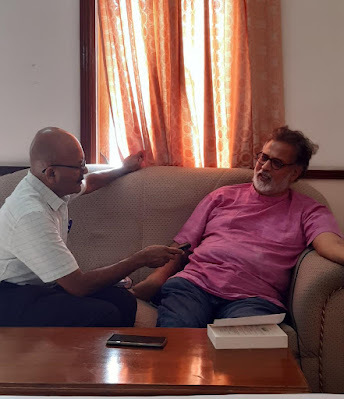
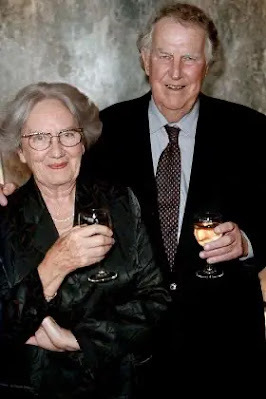
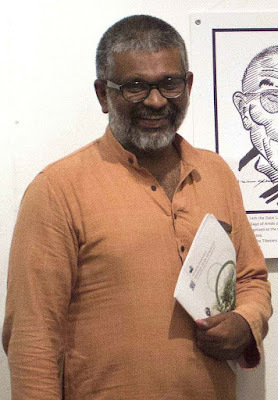
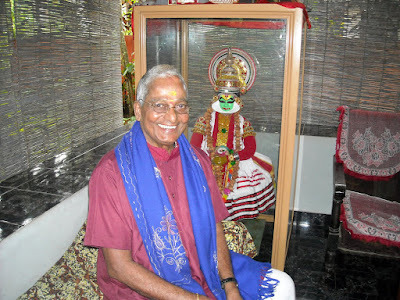 Photos: With Tushar Gandhi, the great grandson of Mahatma Gandhi; Mountaineer Edmund Hillary with his wife Jane; Sethu Das, founder of the Friends of Tibet Foundation and Kathakali legend Kalamanadalam Gopi
Photos: With Tushar Gandhi, the great grandson of Mahatma Gandhi; Mountaineer Edmund Hillary with his wife Jane; Sethu Das, founder of the Friends of Tibet Foundation and Kathakali legend Kalamanadalam Gopi By Shevlin Sebastian
Sethu Das, founder of the Friends of Tibet Foundation, sent me a photograph on WhatsApp. It was of me interviewing Tushar Gandhi, the great grandson of Mahatma Gandhi. As I gazed at the image, my thoughts went back decades.
One day, at 9 am, in the 1980s, I interviewed Edmund Hillary, the first man to climb Mount Everest. This was in the dining hall of the Sinclairs Hotel in Darjeeling. Sitting next to him was his second wife Jane, looking tall but nowhere near Hillaryâs height of 6 feet 5 inches.
Hillaryâs first wife Louise and daughter Belinda died in a plane crash near Kathmandu on March 31, 1975. It was a tragedy from which Hillary never completely recovered.
Like I did with Tushar, I pointed a dictaphone at Hillary. During interviews, I always hold the dictaphone up, instead of placing it on the sofa or at a table nearby. I fear that otherwise, I will not get good audio reception.
I also lean forward and encroach on the otherâs space. With men, it is fine. But with women, I always say, âMadam, I am sorry I have to come closer, because of the dictaphone.â Thereafter, the women are fine.
One benefit of holding the dictaphone is that I can always check whether the red light, which shows a recording is taking place, is flashing. In a few interviews over the years, I have forgotten to press on the recording button. But within minutes, I can detect the mistake. Then I press the button, offer my apologies, and restart the interview from the beginning.
Today, I keep the same habits from three decades ago.
To prepare for my interview with Hillary, I went to the library of Ananda Bazar Publications (ABP) at Kolkata and asked for the clippings file on him. I was working for Sportsworld magazine, an ABP publication.
This was during the pre-Internet era. So I read up all that I could about Hillary. And then as I prepared the questions, I asked myself this question: âWhat is it I want to know?â
In Hilaryâs case, I realised I wanted to know whether he was aware of death during his ascent to the peak of Mount Everest. When I put this question to Hillary, his eyes widened. This was not something he was expecting a young man to ask.
This was what he replied: âI was frightened. I knew one mistake would result in me plunging to my death. So, the triumph is not only over the mountain, but over all the fears and anxieties that are raging inside you.â
It was a memorable answer.
For Tushar, it was a simple decision about what I wanted to know. The state of India at present. But this was what most people, especially liberals like me, would ask him. But as I did my research on Tushar, I came across an interesting item.
The police had detained him on August 9. He was about to take part in the Quit India celebration at Kranti Maidan in Mumbai. I wondered what it would be like when the police detained you. So, I asked him about this experience in depth. And that became the beginning of my article.
After the interviews, the process was the same. I would transcribe the conversation, make it an article, and file it. And the years went by with no major hiccups.
Except once.
In July, 2009, I travelled to Mundur, near Thrissur to do an interview with Kathakali legend Kalamandalam Gopi. This was for my column, âTurning Points in Lifeâ for the âNew Indian Expressâ. I had an enjoyable meeting with him.
I returned to Kochi by train, rucksack on my back, and took a bus to the office. Although there was no seating space, there were few standing passengers. When I got down, something prompted me to check the pocket of the rucksack. And the unthinkable had happened. A pickpocket had filched the dictaphone. It was the first time I experienced the meaning of the term, pole-axed. Something similar would be to have a hollow feeling at the pit of my stomach. Or rather, I felt I had no stomach. âHow did it happen when the bus was not crowded?â I asked myself.
I did not know how I would write the article. I was so dependent on the dictaphone that I hardly remembered the conversation. Through a crime reporter colleague, I filed a police complaint. But, of course, nothing happened. Why should cops bother about a lowly scribe and his silly dictaphone?
So, this is what I did. The first half of the article was a mood piece about my encounter with the maestro and his wife inside the house.
Here it is:
âAt Mundur, near Thrissur, Kathakali legend Kalamandalam Gopi welcomes me with a smile to his home, âGuru Kripaâ. He is wearing a maroon shirt and white mundu.
We settle down on a sofa and soon the interview begins. About twenty minutes into the conversation I tell him I am unable to follow what he has said. Irritated, Gopiyasan says, âThere is nothing more I have to say. I have a sore throat and feel tired.â
It is at this delicate moment that I mention the name of my former colleague, Sreevalsan Menon, a passionate Kathakali fan. He has known Gopiyasan from his childhood.
A few weeks ago, Sreevalsan sent me a wake-up SMS at 4.45 a.m. He was keen to introduce a neophyte like me to the power and magic of kathakali.
There is a Gopiyasan dance being telecast at 5 a.m. And so, with sleep-laden eyes and a stiff body, I switch on the television.
For the next one hour Sreevalsan is on the mobile phone explaining every nuance, mudra, gesture and facial expression. Thanks to this class I am able to appreciate Gopiyasanâs genius.
When Gopiyasan hears this anecdote, he bursts out laughing. His equilibrium restored, the interview resumes once again. He talks with an infectious enthusiasm and joy, and poses for photographs, with his dazzling smile. And so, it is with a grateful shake of his hand that I take his leave and return.â
For the second half, I tried to recall whatever I could. Then I took some material from Wikipedia and completed the article.
As for the thief, I think about him even today. Was he able to sell the dictaphone? It was an old one. How much would he have got for it? It is now 13 years since the theft happened. Is he still getting on buses and stealing from unsuspecting passengers? He could be married now, with children. What would the children think of him, if they come to know their father is a pickpocket?
And one day, surely, his luck would run out, as alert passengers might catch him in the act and get him arrested. Has he spent time in jail? Did he have moments when he felt he should leave thieving and try something respectful? Who knows?
People make choices and pay the price for it. The dictaphone has probably outlived its usefulness and must be lying on some trash heap.
That is life. We do things to survive and if the actions are positive, there are no repercussions.
At the end of the interview with Tushar, as if on cue, the waiter arrived. He had a look of awe on his face. âThe Mahatmaâs mystique remains,â I thought.
The waiter served black coffee and banana fritters. We ate and drank and talked about a variety of subjects including his recent chat with Uddhav Thackeray, the former Chief Minister of Maharashtra.
I felt thankful when I bid goodbye. Thanks to my work as a journalist, I have interacted with so many well-known people. Many of them were high-achievers. Some were geniuses. All pulsated with vibrant energy and infectious enthusiasm. Every day was a joy and a miracle for them.
As for me, the excitement of journalism has not waned. I know of reporters, who have been on a daily deadline for decades, who have burnt out. I may have escaped that fate because I was in feature writing all along. I managed to avoid doing hack work, which can be soul-sapping.
And I thank God for that.
October 26, 2023
A touch of Tibet in Kochi
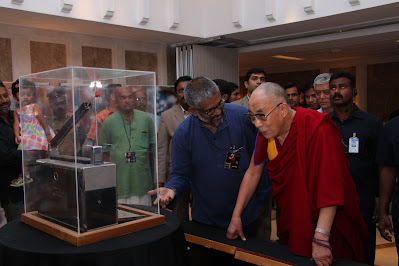
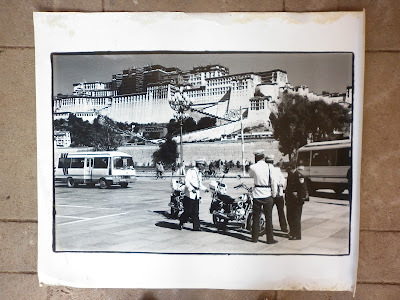
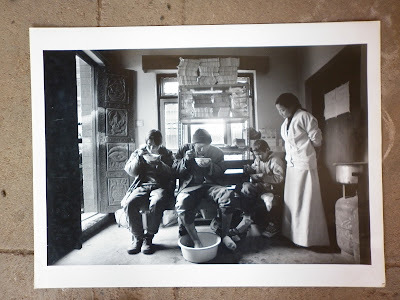
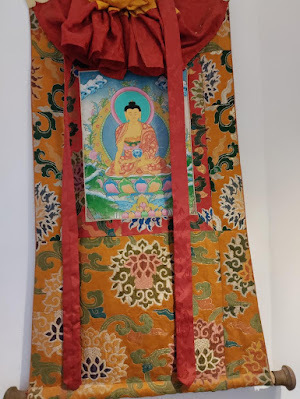
Photos: Sethu Das (in blue shirt), founder of the Friends of Tibet Foundation shows the Zenith Radio to the Dalai Lama; the Potala Palace in Lhasa. Photo by Jaqueline Meier of Switzerland; A father, mother and 12-year-old son who had arrived at the Tibetan Refugee Reception Centre in Kathmandu, Nepal, after trekking over the Himalayas. Photo by Angel Lopez Soto from Spain; a thangka paintingThe Friends of Tibet Foundation has set up a museum and a library about Tibet. Tushar Gandhi, the great grandson of Mahatma Gandhi, and human rights activist inaugurated it on October 22(Published in The Federal)https://thefederal.com/.../why-kochi-is-rooting-for...By Shevlin SebastianIt is a cloudy Sunday afternoon. Panorama Nagar in Kochi is deserted. There are bungalows lining the road. Most houses have grassy lawns, gardens with roses, sunflowers, and marigolds, apart from mango and coconut trees. Silence abounds. Only the chirp of sparrows can be heard. Everybody is taking their afternoon siesta. In front of one bungalow, set at quite some distance from the road, white, red, blue, green and orange flags are fluttering on a wire. This is the first hint that there is something different about the bungalow. And, indeed, it is different. The bungalow houses a museum which is dedicated to showcasing the life and times of the people of Tibet. According to their history, the Chinese invaded and captured Tibet in 1950. Thousands of Tibetans died. Many fled, trekking over their Himalayas, and took refuge in India. In 1959, the Tibetan spiritual leader Dalai Lama sought political asylum in India. It was granted to him. He fled from Lhasa, the capital of Tibet, and trekked over the Himalayan mountain passes and reached Mussoorie. According to government data, there are 85,000 Tibetans living in India today.Inside the museum, one of the first things that catches the eye is Zenith Royal 1000-1 Wavemagnet Transistor Radio. The current Dalai Lama used it when he lived in the Potala Palace in Lhasa. He took it with him when he came to India and established a government-in-exile in Mussoorie, in the state of Uttarakhand in northern India. In 1960, it was shifted to Dharamshala in Himachal Pradesh. âThe Zenith Corporation made it for the exclusive use of the Dalai Lama,â said Sethu Das, the founder of the Friends of Tibet Foundation. âIt was one of the most powerful radios built at that time.âSethu pulled out its very long antenna. âThis was how the Dalai Lama kept in touch with all the happenings in the world,â he said.On November 25, 2012, the Dalai Lama visited Kochi.Sethu said, âYour Holiness, do you remember this radio?âThe Dalai Lama shook his head.Sethu said, âThis is your radio.âThe Dalai Lama laughed heartily, as he hadnât expected to see the radio in Kochi. The Dalai Lamaâs sister, Jetsun Pema, had gifted it to the Friends of Tibet several years ago. On October 22, Tushar Gandhi, the great grandson of Mahatma Gandhi and a noted human rights activist, inaugurated the museum. When Tushar saw the radio, he said, âI feel nostalgic when I see the Dalai Lamaâs radio. It reminds me of the clandestine radio broadcasts by the courageous Congress worker Usha Mehta in Mumbai 75 years ago."Usha had set up the Secret Congress Radio, an underground radio station. She broadcasted the communications of the leaders, many of whom were in prison. It functioned for eight months during the Quit India Movement of 1942. âToday, the Tibetan movement symbolises the battle of right against might,â said Tushar. âThe world must sympathise with the Tibetan people. We Indians must make the battle to regain the homeland of Tibet for the Tibetans our own. We must help to achieve this dream during the lifetime of His Holiness The Dalai Lama. I affirm my solidarity with the people.â At the museum, next to the radio, in a framed photo, are images of Tibetan currency. You can see paper notes like 25 and 100 Sang notes. They were in circulation till 1959.There is a long-distance shot, by Jaqueline Meier of Switzerland, of the magnificent Potala Palace. It is located high up on the Red Hill. In the massive courtyard in front, there is a group of Chinese police officers standing around. This is a stark reminder of the invasion. Thousands of Tibetans died at the hands of the Chinese troops. One of Indiaâs greatest spiritual teachers, Osho, said, in a speech at Pune, in 1988, âTibet has fallen into darkness. Its monasteries have been closed. The Chinese have forced its seekers of truth to work in labour camps. Nowhere in the world has there been such a concentrated effort to discover manâs inner being. But the communist regime has destroyed everything that the people had built in the past two thousand years.â In another image, taken by Angel Lopez Soto from Spain, a father, mother and 12-year-old son had arrived at the Tibetan Refugee Reception Centre in Kathmandu, Nepal, after trekking over the Himalayas. They are sitting on a bench and having soup, their eyes cast downwards towards the bowls. They looked weather-bitten and hungry. The father has placed his foot in a basin of warm water. âHe may have suffered from frostbite,â said Sethu. âThis is a scene from the 1960s.â A young woman, in a white top and floor-length skirt, stood on one side and watched them with a solicitous look on her face. On another wall hangs a thangka. It is a Tibetan Buddhist painting which is painted on cloth. It depicts Lord Buddha, who is sitting crossed-legged inside a lotus. âThey make the paints from natural plants,â said musician Nirmal Anthony, a member of the Friends of Tibet. âThe lotus is a flower that grows in the mud but is untouched by it. Buddhaâs message is: âYou should live in the world but remain unaffected by its vicissitudes.â The thousand-petalled lotus symbolises the enlightened state of human consciousness.â There is also a photo, taken by Mumbai-based photographer Suresh Natarajan, of a smiling Dalai Lama, sitting on an armchair in his office in Dharamshala. The Dalai Lama radiates positive energy because of his twinkling eyes. He looked to be in his fifties. A copy of the American magazine, Newsweek, is lying on a low table in front of him. Today, the Dalai Lama is 88 years old. Other photos show the vistas of the Tibetan landscape with its blue skies and high mountain ranges. Some items have been placed on a table. These include the first Tibetan passport used by the Finance Secretary Tsepong Wangchuk Dedhen Shakabpa; the 1934 September edition of the National Geographic magazine carrying the image of the Tibetan National Flag in the âNational Flags of the Worldâ; Chinese Communist Party Chairman Maoâs âLittle Red Bookâ, and a uniform worn by the Chinese soldiers during the invasion of Tibet. A visitorâs viewSudheer Nath is a Delhi-based journalist cum cartoonist. Once or twice a month, he comes to Kerala to visit his family. He dropped in to view the museum. âIf you visit the museum without knowing the history of Tibet, you will not get an idea of the pain and despair behind the photos,â he said. âIt will be ordinary photos for those who are ignorant. But for me, it was a deeply moving experience.â Sudheer has been a keen follower of the Tibetan issue for 25 years and has attended many functions of the Friends of Tibet. He has visited the Tibetan refugee colony called Majnu Ka Tila near Kashmere Gate in Delhi. âI am a supporter of Tibetan independence,â he said. There is also a library which houses hundreds of books about Tibet. You can see âA Journey in Ladakh: Encounters with Buddhismâ, by spiritual teacher Andrew Harvey; âTibet: Reports from Exileâ by Tibetan author Thupten Samphel, and âThe Definitive Account of the Dalai Lama and Tibetâ, written by American journalist John F Avedon. There is a book by the Dalai Lama, called âAwakening the mind: Lightening the heart.âAttracted to Tibet Sethu was working as a graphic designer with the âEconomic Timesâ newspaper in Mumbai. During a vacation, he landed in Dharamshala with a photographer friend. That was when he encountered Tibetan monks with their distinctive maroon cloaks. He got curious and did interviews to know more about them.When some of them refused to speak, he realised later the Chinese had cut off their tongues. He felt an ache in his heart. âI discovered my lifeâs work and passion in Dharamshala,â he said. Soon, he gave up his job. Thereafter, he set up the Friends of Tibet at Mumbai in 1999. This was followed, in the same year, by the setting up of the Friends of Tibet Foundation in his hometown of Kochi. The Foundation works to safeguard and advance Tibetan heritage, including their healing traditions.âWe are conducting research on the unique heritage, legacy and history of Tibet,â said Sethu. The Foundation works with scholars, scientists, health experts, and sociologists to publish research papers.During the Kochi International Art Biennale, in December, 2022, the Foundation set up âShadow Circus: A Personal Archive of Tibetan Resistance (1957-74)â. Activist film-makers Ritu Sarin and Tenzing Sonam curated it.Karma Yeshi is a former finance minister of the Tibetan Government in Exile. He said that the Friends of Tibet are doing wonderful work, mainly in South India and Mumbai. âThey have made the people aware of the sufferings of the Tibetan people,â he said. âAll this has happened because of the immense dedication and sincerity of Sethu and his team, Suku, his brother, and their father CJ Yesudasan (1938-2021), one of Kerala's well-known cartoonists. Because of them, many other people have joined the group. All of them are so sincere.â------------------------------------BoxTibetan Medical CampNext to the museum is a doctorâs chamber. Dr. Dorjee Rapten Neshar conducts a three-day medical camp once every two months. âSowa Rigpa, or the Science of Healing, is one of the worldâs oldest known medical traditions dating back to the 4th Century AD,â said Dr. Neshar. âThe Indian healing system of Ayurveda has influenced Tibetan medicine. We use pulse and urinalysis. Our medicines are composed of herbs and minerals. We have physical therapies like acupuncture.âAround 100 patients come to seek treatment.One of them is Sreelal. He is an artist and teaches art at the Emmanuel College at Vazhichal, 43 kms from the capital of Thiruvananthapuram. On the evening of February 4, 2022, after returning from college, he complained of a headache to his wife, Chitra. So, he lay down on the bed. Suddenly, there were tremors on his face and blood shot out from his mouth. Chitra took him to the hospital. The hospital could not diagnose whether it was a stroke or a fit. âSince it was during Covid, the doctor put him on a ventilator,â said Chitra, who works in a government office. After 15 days, the doctor took him off the ventilator and Sreelal became normal after a month. âThrough the next year, now and then he would have fits,â said Chitra. âSreelal began slurring on some words. The hospital kept increasing the dosage. Sreelal became bedridden and slept a lot. He became absent-minded.â Mathew, a friend, suggested that they consult Dr. Neshar. âWe were hesitant to bring him,â said Chitra. âI had not heard of Tibetan medicine earlier.âBut on July 5, this year, Chitra brought Sreelal to the medical camp in Kochi. When Dr Nasher inspected Sreelal, he was shocked at the high dosage of medicine that he had been taking. He reduced the dose and also provided Tibetan medicines. The tablets have to be grounded and immersed in warm water. Sreelal took the liquid three times a day. Within days, there was a marked improvement. Sreelal is also doing physiotherapy. He can walk now. âHe is eating with his left hand, even though he is right-handed,â said Chitra. âI donât know what it is, but Tibetan medicine is amazing. I am sure Sreelal will make a complete recovery.â
October 22, 2023
Chronicling the Cochin Jews
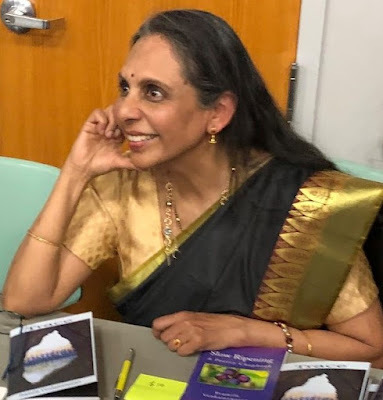
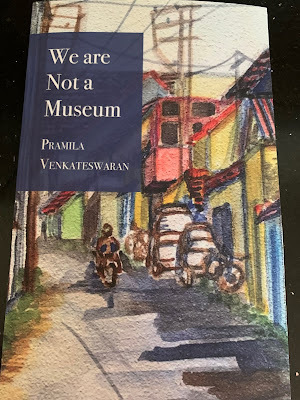
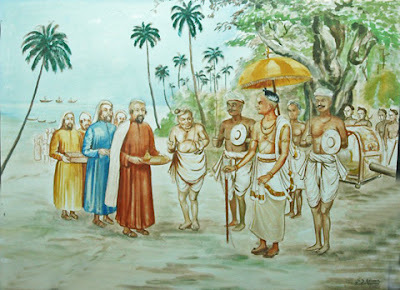 Pramila Venkateswaranâs book of poems, âWe are not a museumâ, has won the best poetry award at the New York Book FestivalBy Shevlin Sebastian(Published in scroll.in: https://scroll.in/.../meet-pramila-venkateswaran-winner...)On the morning of July 26, when Pramila Venkateswaran opened her eyes, she saw it was dark outside the window of her house in Long Island. There was a steady pitter-patter of the rain. Pramila was glad that because of the summer holidays, she did not have to go to work. She is Professor, English and Women and Gender Studies at Nassau Community College 58 kms away.She went to the kitchen and made herself a cup of coffee.After a while, her husband IV Ramakrishnan came in, carrying a black briefcase. He was wearing a blue shirt and black trousers. Pramila liked the way he kept his white beard so trim and proper. Ramakrishnan is Professor and Associate Dean in the Department of Computer Science at Stony Brook university. It was a five-minute drive away.âHappy birthday,â he said, as he gave Pramila a peck on her cheek. âLetâs go out for dinner today.ââOkay,â said Pramila. âHopefully, the rain will stop by then.ââI think it will,â he said, as he headed towards the door.Carrying her cup of coffee, Pramila went to her study, opened her laptop and checked her mails.One email said she had won an award. She thought, âWhat is this? I donât remember applying. This canât be true.âAnyway, Pramila clicked on the link. She realised she had won the first prize for poetry for her book, âWe are not a museumâ. This was in the competition held by the New York Book Festival.Pramila had sent an entry over ten months ago. So she had forgotten about the event. Immediately Pramila thought, âWhat a perfect birthday gift!âShe sent the link to her daughters living in different parts of America and to her husband. She also posted the link of the award online. Soon, congratulatory messages rolled in.The book is about the life and times of the Cochin Jews, a declining community. There are less than 15 members left. As a child, she spent a few years in Jew Town.âI would run in and out of the Paradesi Synagogue,â she said.
Pramila Venkateswaranâs book of poems, âWe are not a museumâ, has won the best poetry award at the New York Book FestivalBy Shevlin Sebastian(Published in scroll.in: https://scroll.in/.../meet-pramila-venkateswaran-winner...)On the morning of July 26, when Pramila Venkateswaran opened her eyes, she saw it was dark outside the window of her house in Long Island. There was a steady pitter-patter of the rain. Pramila was glad that because of the summer holidays, she did not have to go to work. She is Professor, English and Women and Gender Studies at Nassau Community College 58 kms away.She went to the kitchen and made herself a cup of coffee.After a while, her husband IV Ramakrishnan came in, carrying a black briefcase. He was wearing a blue shirt and black trousers. Pramila liked the way he kept his white beard so trim and proper. Ramakrishnan is Professor and Associate Dean in the Department of Computer Science at Stony Brook university. It was a five-minute drive away.âHappy birthday,â he said, as he gave Pramila a peck on her cheek. âLetâs go out for dinner today.ââOkay,â said Pramila. âHopefully, the rain will stop by then.ââI think it will,â he said, as he headed towards the door.Carrying her cup of coffee, Pramila went to her study, opened her laptop and checked her mails.One email said she had won an award. She thought, âWhat is this? I donât remember applying. This canât be true.âAnyway, Pramila clicked on the link. She realised she had won the first prize for poetry for her book, âWe are not a museumâ. This was in the competition held by the New York Book Festival.Pramila had sent an entry over ten months ago. So she had forgotten about the event. Immediately Pramila thought, âWhat a perfect birthday gift!âShe sent the link to her daughters living in different parts of America and to her husband. She also posted the link of the award online. Soon, congratulatory messages rolled in.The book is about the life and times of the Cochin Jews, a declining community. There are less than 15 members left. As a child, she spent a few years in Jew Town.âI would run in and out of the Paradesi Synagogue,â she said.Her father, R Venkateswaran, worked as a manager in Canara Bank. The management had transferred him to the Fort Kochi branch. âHe became close to the Jewish community,â she said. âAnd especially with Satu Koder, a leading entrepreneur, who was the warden of the synagogue for over 40 years.âBoth worked together, in 1968, to celebrate the 400th anniversary of the synagogue. Prime Minister Indira Gandhi was the chief guest. For several years after that, in her parentsâ house, there hung a large black-and-white photograph. This comprised Indira Gandhi, Venkateswaran, his wife, Kausalya, and Satu Koder standing together.What Pramila remembered was how entranced she was by the inside of the synagogue. She recollects the memory in this excerpt from her poem, âI was sevenâ from her book.Oh,there is so much gold and red in this temple,the tall lamps are lit and multicoloured glass dancetheir hues on the windows. How strangethe objects in the roomâthe tall table, the big book,the writing on the walls. I do not even knowwhat building weâre in until Amma explains,âIt is a synagogue, a Jewish temple.â I carry the soundof my light steps, velvet in my eyes.For the past 20 years, Pramila had been writing poems about her childhood. Inevitably, she wrote about her time in the synagogue. She had no plans to write a book about the Cochin Jews, but as she reflected on the rich syncretic tradition in Kerala, where the mosque, church and the synagogue stood side by side and in harmony, Pramila felt she should do so.In 2009, when she visited the synagogue, she saw tourists from all over the world. Pramila said, âI thought, âOh my God, people are coming there to view it. But there are actual Jews who are living there.â Hence, the title of the book came up, âWe are not a museumâ.âAnd here is the poem:We are Not a MuseumThe whole world seems to have landed on our doorstep.How did this happen? Yesterday a woman was peepinginto my bedroom. Now I close my doors and windowsto keep out nosy tourists creeping around Mattancherry.A journalist called asking me about my life in Kochi.I said it is like any other womanâs. I have a huge loadof laundry to wash, dishes to scrub, chickensto pluck. Iâll rest only in the grave. So goodbye.I donât care if they think we are strange or important.It is absurd. Weâre like any other Indian in this townstruggling to make life better for our children. I wantthe lot of them out of this town and out of our lives.Pramila began researching the history of the Cochin Jews. She read books about anthropology, history, sociology and ethnographies related to Jewish women from Cochin and people who moved to Israel from Cochin.When Pramila was studying at Bombay University, she came in touch with the Bene Israel Jews. Her English Professor, Nissim Ezekiel (1924-2004), one of Indiaâs well-known poets, was a Bene Israel Jew. âHe was my mentor,â she said. âSo, I felt very close to the community.â In New York, Pramila has befriended other Bene Israel Jews like the poet Zilka Joseph.Not surprisingly, Pramila wrote about Anti-Semitism in âThe Face of the Otherâ:the face speaks to me and therebyinvites me to a relationâ¦Emmanuel Levinas, âTotality and InfinityâWhy do some see yellow starsinstead of faces, their marauding pensmarking the cityâs walls with swastikas?Hate clouds barrel down the agesfrom the Black Sea and Ararat, from the Nileand Babylon. It storms inamong starched shirts and rags.Why is a Jewish child selectedto be erased? Philosophers sayto love is to see the other in oneself. Butthe other blends into the unknowable.I ask, doesnât a child crying for his momon any street around the globemake you wince?Asked about the themes, Pramila said it was an emotional experience of what it is like to be a Jew in Cochin. âI was putting my imagination into the writing,â she said. So Pramila imagined the first immigrants coming to the Kerala coast. One poem looked at the paintings of the Cochin Synagogue. A few poems talked about how persecuted Jews embarked on perilous journeys from Iraq and modern-day Palestine to India.Another poem described the impact of the presence of the Portuguese, the Spanish and the English from the 15th to the 18th centuries. âThere was fighting between these European colonists,â said Pramila. âThe Jewish community was caught in between. The Portuguese torched their synagogues in Cranganore and they fled by boat to the Cochin harbour.âPramila wrote a poem about the generosity of the King of Travancore.Chorus: At the Palace of the Raja of CochinRajadi Raja, your royal highness Ramavarma Kulashekara Perumal,we bow before your blessed feet. The morning breezes bringtidings of something new to our Keral coast. Menand women with children arrive in boats, speaking atongue we have not heard before. They look like merchantsfrom Arabia, but are different. The men wear capson their heads and the women wear long, pale skirts,have dark eyes like the apsaras in your court,wear no ornaments in their dark brown and black hair,and walk with a firm gait beside their men.Rajadi Raja, the men are at the palace gates and askto pay their respects to you. They bear baskets of driedfruit, dates, almonds, pistachios, apricots and olives,saplings of plants that may or may not grow here,seeds and coins. Their hands that bear the stain of labour,lovingly hold their children. They speak words wedonât understand, but there is grace in their speechand beauty in the treasures they bear for your majesty.We will open the gates for their visit, so they gatherin the shade of the palace courtyard and await your presence.We bow to you, sire, lord of the Keral coast, master of ourblessed land of Parasurama who continues to bless us.The King looked at them with sympathy. âHe felt they were worthwhile people who needed help,â said Pramila. âSo, he gave them land to settle down. He allowed them to build a synagogue. And the Jews prospered. It was a very different engagement for the Jews with the outsider. It was so different from what happened in Jewish history in other countries.âThe surrounding communities were so varied. The Jews interacted with Muslims, Christians, Buddhists, members of the Gujarati community and the Konkanis from Goa. âI have written poems that bring out this varied culture,â said Pramila. âI also wanted to distil the historical record through poetry.âThere are 35 poems. And the book has been well received. âThis is a sensitive and well-crafted collection. âWe are not a Museumâ skillfully and thoughtfully blends two cultures into one with its unique juxtaposition of the two,â wrote poet Kavita Ezekiel Mendonca. âThe closeness and the shared bonds between the poetâs community and the Cochin Jewish community in her hometown in India become a timeless fabric of personal and universal history. The poetâs knowledge of the Jewish community is evident in each poem. I can almost smell the aroma of spices as the Jewish immigrants make their way to the Zamorinâs palace.âAnother poet Marjorie Agosin said, âAn exquisite collection of poems, where history and lyricism dwell in the memory of the Jews of Cochin, where time and centuries of persecution have tried to erase them. Pramila Venkateswaran is a poet of resilience and of hope. "Each of these poems engages the reader in the sensual landscape of Cochin, the smell of oranges and pomegranates as well as the poignant stories of those that lived in these places and those that return through memory and poetry. A poetry that moves your soul and enchants your heart.âPramila is an established poet. Her other books include âThirthaâ (2002), âBehind Dark Watersâ (2008), âDraw Me Inmostâ (2009), âTraceâ (2011), âThirteen Days to Let Goâ (2015), âSlow Ripeningâ (2016) and âThe Singer of Alleppeyâ (2018).Of course, the road to publishing has been difficult, because poetry has no market. For her first book, she approached around 50 publishers before she got Yuganta Press to publish it. The same thing happened for âBehind Dark Watersâ, her next book. She approached publishers on three different continents. Finally, a publisher in Texas, Plain View Press, published it.âThe third and fourth were not that hard,â she said. âBut my latest manuscript, tentatively titled âWallsâ, I have been trying for the last two years, and have made no headway.âPramila said her win will not make any impact on the chances of publishing. âYou are back to the drawing board all the time,â she said.Asked about the poetry reading public in the US, Pramila said, âIt is miniscule, when compared to the readers of the novel and short stories. This is the case with most countries, including India.âIncidentally, the rain did stop and the couple enjoyed a celebratory dinner at Sagar Indian restaurant on Long Island.
October 20, 2023
Podcast Interview regarding writing
 One of Americaâs pre-eminent authors of the 20th century, John Updike (1932-2009) once wrote, âIn America, one of the wealthiest countries in the world, less than 100 people have been able to survive by writing alone.â In India, thanks to the OTT boom, many writers are earning their living by working as scriptwriters. One of them is K Hari Kumar. He has been the screenwriter for three films, a script consultant for multiple web series and is the author of seven books, mostly in the crime and horror genre. Three books are in the pipeline. Now Hari Kumar is venturing into the audio and video space. I was happy when Hari Kumar interviewed me for his new podcast called âThe Story Vaultâ. In it, we discuss the nuts and bolts of writing a non-fiction book and a host of other topics. Thank you Hari.Please listen on these links:https://open.spotify.com/episode/5g7lvcNWOLevJKe4dU8JsThttps://eplog.media/.../the-stolen-necklace-carving...https://podcasts.apple.com/.../the-story.../id1708607132
One of Americaâs pre-eminent authors of the 20th century, John Updike (1932-2009) once wrote, âIn America, one of the wealthiest countries in the world, less than 100 people have been able to survive by writing alone.â In India, thanks to the OTT boom, many writers are earning their living by working as scriptwriters. One of them is K Hari Kumar. He has been the screenwriter for three films, a script consultant for multiple web series and is the author of seven books, mostly in the crime and horror genre. Three books are in the pipeline. Now Hari Kumar is venturing into the audio and video space. I was happy when Hari Kumar interviewed me for his new podcast called âThe Story Vaultâ. In it, we discuss the nuts and bolts of writing a non-fiction book and a host of other topics. Thank you Hari.Please listen on these links:https://open.spotify.com/episode/5g7lvcNWOLevJKe4dU8JsThttps://eplog.media/.../the-stolen-necklace-carving...https://podcasts.apple.com/.../the-story.../id1708607132
September 30, 2023
Frontlist Magazine interview
September 17, 2023
Short Story: 'Slow Turn Of The Weel'

My short story, 'Slow Turn of the Wheel' is the 'Editor's Pick of The Week' in the Singapore-based http://kitaab.org
https://kitaab.org/2023/09/17/short-s...¦
Trigger warning: Graphic Sexual Violence
Slow Turn Of The Wheel
By Shevlin Sebastian
Devi Manjhi leaned against the thatched wall as she sat on the mud floor. She cupped her face in her palm, while her elbow rested on an upraised leg. The room was in semi-darkness. Devi had placed a kerosene lamp on a low stool. She faced the door. Outside, moonlight lit up a section of the small courtyard.
It was 9 pm. Her husband Dilip has not yet arrived home. He worked as a gardener in the house of a Brahmin landlord. Devi had every right to be concerned. Anything could happen to the lower castes. The men were subject to random acts of violence; the women bore a substantial risk of being raped suddenly and without provocation.
âWhat has happened to Dilip?â she thought. She knew that on a Saturday night, after work, he sometimes stopped at a shed where they sold country liquor. But usually, Dilip informed Devi in the morning before he set out for work.
Devi was childless. Her husband was the only anchor she had in this world. Both her parents had died. The neighbouring women looked down on her because she had been barren. They were also busy looking after their children and husbands. So, she was reluctant to go across and ask the menfolk to go in search of her husband.
Devi worked in the rice fields, planting paddy saplings during the day.
Both Dilip and Devi earned enough to live comfortably.
Devi knew their marriage was stagnant. A couple of children would have brought Dilip closer to her. But the doctors said she was physically okay. Yet, no baby was born. She wondered whether the problem was with Dilip. But then he got an erection all the time.
Devi bemoaned her lack of education. She studied only until class three. There were so many things about which she did not know. Time was passing.
Devi was 40. Dilip was 52. They did not make love as often as when they were trying for children. She wondered whether Dilip was losing interest in her.
Devi stood up and scratched her butt. When she felt nervous, she always did that. Then she moved to the door and stared into the darkness. There were a few stars in the sky. She could hear the shouts of mothers scolding their children. But in her hut, it was quiet. Smoke rose from the mud stove of a nearby house and passed through a window. There was the ubiquitous sound of crickets.
So, what had happened to Dilip? To live life without a man beside you in this caste-ridden and violent society would be dangerous for her.
Dilip had indeed stopped at the shed to have a couple of pegs of India Made Country Liquor. It was there that he met a man who told Dilip he had become a father. Dilip frowned, as he wondered whether the man had mistaken him for somebody else.
âI donât understand,â he said.
The man stared at him, and said, âLast year, you raped a young woman in a
paddy field. She got pregnant and gave birth to a boy.â
âI donât know what you are talking about,â he said. Dilip had only a couple of pegs, so he was in his senses. He knew grave danger lay ahead, and he was thinking at top speed.
Again, the man stared at him. Like Dilip, he was 50 years old, specks of grey in his hair, with a trim moustache. Dilip guessed he was the girlâs father. Otherwise, why would he be interested in finding out who raped the girl?
âI did not do it,â Dilip said. âOn what basis are you accusing me of rape?â
There was a clinking of glasses and loud guffaws. This was the place where only Dalits came. So, they felt free to be themselves. Beedi smoke hung in the air. The odour was of fried masala. Middle-aged and elderly men occupied most of the tables. Dilip had been drinking alone when this man came and sat opposite him.
âShe is my daughter,â he said. âShe had said she had noticed a scar on the manâs throat. Which you have. I travelled to all the neighbouring places. And then today I saw you.â
He asked the man from which village he came from. The man mentioned a village about 50 kms away.
Dilip said, âDonât you think you should look closer to your village than here?â
The man said that they were visiting his sister in the next village. His daughter had stepped out to urinate when the incident happened. She mentioned nothing until she was four months pregnant. By then, it was too late to do anything. Now the boy is a year old.
âYou can imagine how she is being treated in our village,â the man said. âFew people believe her story of rape. I am desperate to find the boyâs father. Nobody is interested in marrying her now.â
Dilip shook his head and said in an even tone, âYou have made a grave accusation against me, based on flimsy proof. You know I could end up in jail for years. The authorities might even hang me. You know the impact this will have on my wife and family. I assure you I did not do such a thing. Do I look like a rapist?â
The man stared at Dilip.
Dilip stared back.
âIt is a mistaken identity,â continued Dilip. âIn this district there are many people with scars, because there is a lot of violence.â
The man blinked and said, âI am sorry. I think I have made a mistake.â Then he stood up and left without another word. Dilip watched him leave, his head bowed, and exhaled softly.
He wondered whether he was in the clear. Or whether the man would come back again. He had a feeling he would have to stop drinking in these public spaces for a while.
He left the bar after taking another peg.
On the way, Dilip recalled the event clearly. It was also a moonlit Saturday night.
He had been returning home, quite high. Near a paddy field, he had seen a young woman who had come out of the house to urinate. There were no bathrooms in the thatched huts. That was when he grabbed her from behind, clamped her mouth, and dragged her to a row of trees nearby. Then he pushed her to the ground. She tried to push back, but he was far stronger.
Dilip estimated she must have been about 20 years old. He lifted the skirt with his other hand, untied his pyjama strings, and entered her. The girlâs eyes opened wide as she shook her head from side to side. She let off a smell of sweat mingled with talcum powder.
It was a high-risk activity. The duo would have been clearly visible to anyone who appeared near the trees.
Anyway, within a few minutes, it was over. Dilip slapped the girl so hard across her face, she fainted. He looked around. There was nobody around. He was lucky.
He pulled his white pyjamas up, stood up, and walked in the opposite direction from his home. He would take a detour and go back.
Meanwhile, as he walked on the bund between the paddy fields, Dilip thought, âHow could this stranger conclude I am the father? She might have had other lovers. It was not 100 percent sure I was the father.â
He wondered why he did it. Devi rarely said no to his sexual advances unless she was having her period. She was always keen to try, in the hope she would get pregnant. It was just an impromptu act; he realised. Dilip felt regret that she had gotten pregnant and ruined her life. But he was helpless in this matter. There was no way he could come forward and claim paternity. The police would jail him for years.
Dilip felt regret that his son was growing up somewhere without the presence of a father. Even if the girl got married, the boy would only have a stepfather.
Dilip had forgotten about the rape completely. Many months later, it felt like a dream. After all, it lasted a few minutesâ¦
Devi finally sighed loudly, as she saw Dilip appear in the distance. âHe is fine,â she thought. âThank God for that.â
As soon as Dilip saw her strained face, he said, âI am sorry I did not inform you. But it was a sudden decision on my part.â
Devi nodded and headed to the kitchen to make chapattis. Later, she cut an onion into small pieces and sliced a cucumber.
Later that night, lying next to each other, he had sex with her. Devi was happy. It meant he still had some desire for her. But for Dilip, he wanted to take out the stress of what had happened at the bar and the memories that had awakened in him.
For the next few days, Dilip always looked around when he walked. But he did not see the man who accused him again.
The months and years rolled by.
Slowly, Dilip relaxed. He asked God for forgiveness. He had done a grievous wrong. But in his life, that was the only error that he made. Surely God can forgive him for that. No man is infallible. âWe all make mistakes,â he told himself.
Dilip did not pay any price for that mistake. While the victim paid a steep price.
Unable to bear the ostracism she faced, Mouna travelled to Patna with her son, Mahesh. There she got a job in a convent as a servant girl. She told the nuns that a train ran over her husband while he was crossing the tracks. The nuns did not ask which train and on which track. They believed her. She worked sincerely. The nuns enrolled her son in an English-medium school run by the Catholic Church. In the evening, when Mahesh returned from school, the sisters tutored him. He did well in his studies.
But now and then, Mahesh would ask about his father. Mouna would speak about his tragic death. When he was younger, Mahesh listened silently. But as he grew older and entered his teens, the questions became sharper: Where did his dad stay? Which village? What did he do for a living? How many brothers and sisters did he have? How did Mouna meet him? Was it an arranged marriage?
Mouna knew if she started answering these questions, she would have to tell a lot of falsehoods. So, she suggested a compromise. She would tell the full story a day after he graduated.
Mahesh was a stellar student. Thanks to his education, he spoke fluent English and graduated with a BA in economics. He intended to pursue his masters. Mouna was so proud of him.
And Mouna kept her word. A day after the results were out, she sat him down in her bedroom and told him the story from beginning to end. She saw the cheerful look on her sonâs face gradually turn to sadness and then to anger. He narrowed his eyes and bit his lips. A frown appeared on his forehead.
According to Mouna, it may have been a mistake, a moment of madness on the manâs part. She mentioned the scar that he had seen on the manâs throat. âBut we still do not know who the person is. All my father said was that he saw a man with a scar on his throat in Shakarpur village in Munger district,â she said.
Mouna could no longer ask her father for clarifications because he had died of renal cancer a few years ago.
Mahesh immediately googled to know the distance from Patna to Munger. It was 175 kms. Shakarpur was just three kms from Munger.
Early one morning, he boarded the Intercity Express, which had a stop at Munger.
As Mahesh travelled across the Bihar countryside, Dilip, now 69 years old, was sitting on a cot placed outside his hut. Devi, as was her wont, came out and gave him tea in an earthen cup. It was a chilly December morning. Dilip had wrapped himself in a shawl. His hair was completely grey now. But he continued to work as a gardener. He was listening to the morning news on All India Radio.
Little did he know that retribution was travelling towards him on an Indian Railways train.
Mahesh was planning to file a FIR. Then he would take this man with a scar to Munger for a DNA test. If no test were available, he would take Dilip to Patna. Finally, Mahesh would get the answer of whether this man was his father.
Even if he was, Mahesh would ensure he got the punishment he deserved. But, of course, things would not be that simple. Once Mahesh met Dilip, he would fall into a dilemma. Should he send this man to prison? After all, he was his father. Should he forgive or not?
It would all depend on Mounaâs reaction. If she insisted on revenge, most probably, Mahesh would go along with it.
All these possibilities lay in the future, as Mahesh calmly read news snippets and watched YouTube videos on his mobile phone.
September 12, 2023
Author interaction at St. Albert's College, Kochi
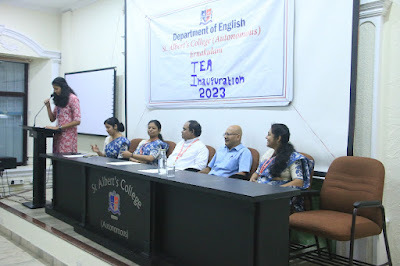
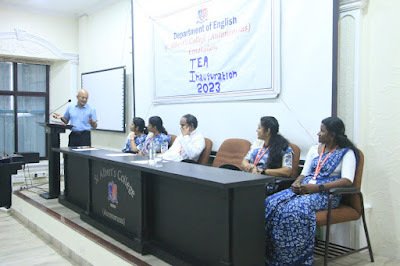
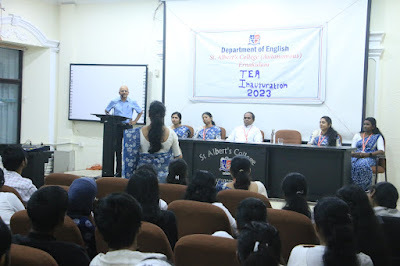
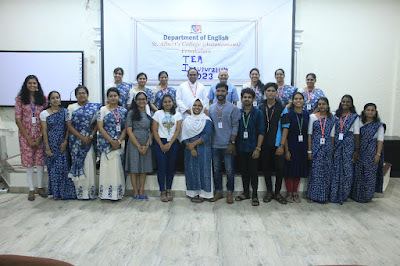
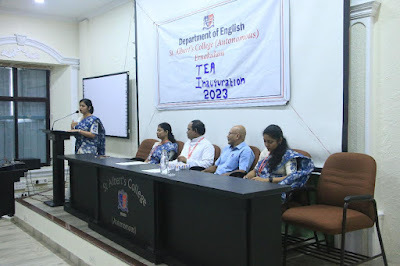
Captions: Mistress of Ceremonies is student Nandana Narendranath. She welcomes the gathering
Talking about 'The Stolen Necklace'
Assistant Professor Dr Sweetha Saji asks a question
With the staff and the student organisers of the programme. At the centre is Rev. Dr. Antony Thoppil, chairman and manager of St. Albert's College, Kochi
Assistant Professor Devika V giving the vote of thanks


